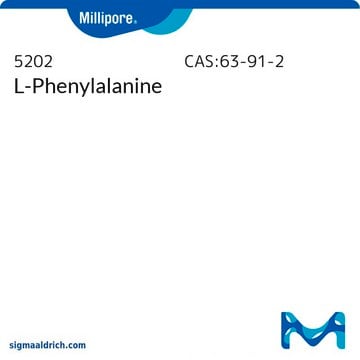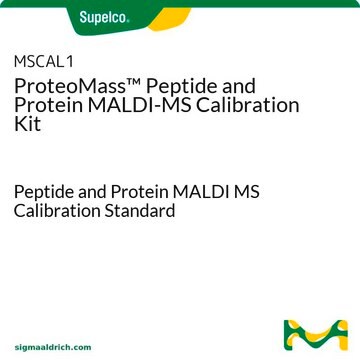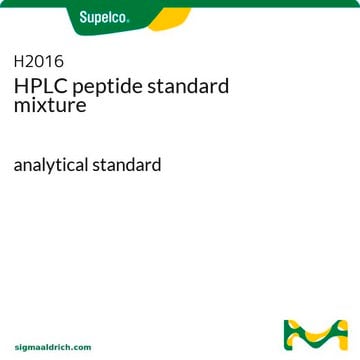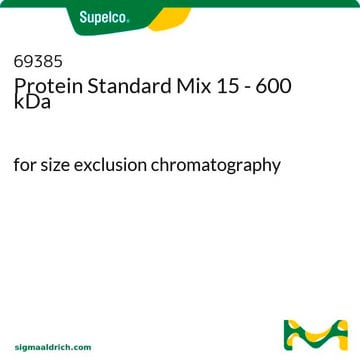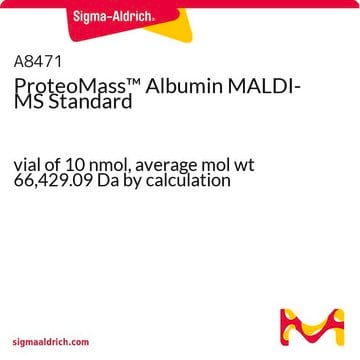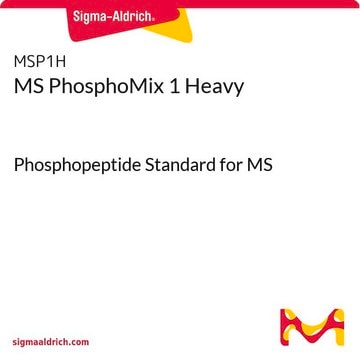UPS1
Universal Proteomics Standard Set
Protein Mass Spectrometry Calibration Standard
Sinonimo/i:
Standard Set
About This Item
Prodotti consigliati
Forma fisica
ready-to-use solution
Livello qualitativo
Qualità
Protein Mass Spectrometry Calibration Standard
tecniche
mass spectrometry (MS): suitable
Temperatura di conservazione
−20°C
Categorie correlate
Descrizione generale
Applicazioni
- Bracketing critical experimental datasets for confirming the robustness of analysis methods
- Comparison of MS or other proteomic data that are generated in different labs using a variety of analytical strategies and instruments
- Identifying limitations of proteomics analysis systems and search algorithms
- An external reference to assist with the evaluation of data derived from poorly defined samples
Caratteristiche e vantaggi
- Test the power of your analytical strategy
- Troubleshoot and optimize your analytical protocol
- Confirm system suitability before analyzing critical samples
- Normalize analytical results day to day or lab to lab
I componenti del kit sono disponibili anche separatamente
- T6567Trypsin from porcine pancreas, Proteomics Grade, BioReagent, Dimethylated 20 μgSDS
Prodotti correlati
Avvertenze
Danger
Indicazioni di pericolo
Consigli di prudenza
Classi di pericolo
Acute Tox. 4 Oral - Eye Dam. 1 - Repr. 1B - Resp. Sens. 1 - Skin Irrit. 2 - STOT SE 3
Organi bersaglio
Respiratory system
Codice della classe di stoccaggio
6.1C - Combustible acute toxic Cat.3 / toxic compounds or compounds which causing chronic effects
Classe di pericolosità dell'acqua (WGK)
WGK 3
Certificati d'analisi (COA)
Cerca il Certificati d'analisi (COA) digitando il numero di lotto/batch corrispondente. I numeri di lotto o di batch sono stampati sull'etichetta dei prodotti dopo la parola ‘Lotto’ o ‘Batch’.
Possiedi già questo prodotto?
I documenti relativi ai prodotti acquistati recentemente sono disponibili nell’Archivio dei documenti.
I clienti hanno visto anche
Articoli
High-throughput proteomics advances with improved analysis methods and mass spectrometry.
Contenuto correlato
Standardize research with Universal and Dynamic Proteomics Standards, complex and well-characterized reference standards for mass spectrometry.
Il team dei nostri ricercatori vanta grande esperienza in tutte le aree della ricerca quali Life Science, scienza dei materiali, sintesi chimica, cromatografia, discipline analitiche, ecc..
Contatta l'Assistenza Tecnica.
